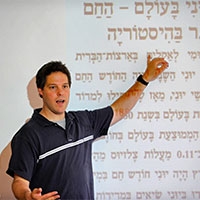Middlebury College and Hebrew at the Center Launch Hebrew Language Institute

MIDDLEBURY, Vt. ― Middlebury College announced today that it will partner in the creation of a new institute intended to fill a critical gap in the field of Hebrew language instruction. Middlebury will launch the institute through a partnership with Hebrew at the Center (HATC), a nonprofit organization based in Newton, Mass., dedicated to advancing Hebrew teaching and learning.
Called the Middlebury-HATC Institute for the Advancement of Hebrew Language, the new organization aims to address a critical shortage of Hebrew language educators. Led by Vardit Ringvald, an international expert in Hebrew education, the new entity also will promote professional development in the field, from encouraging the growth of graduate degree programs to supporting research.
“Our goal is to establish the preeminent center for teaching and learning Hebrew in the United States,” said Middlebury College President Ronald D. Liebowitz. “I’m pleased that Vardit Ringvald will lead this effort, and her work with both the college and at Hebrew at the Center, where she is a founding member of the board of directors and senior academic advisor, makes her uniquely qualified for this position.”
Ringvald, former director of the Hebrew language program at Brandeis, where she taught from 1985 until earlier this year, is the founding director of the Brandeis University-Middlebury School of Hebrew.
“We know we can achieve our aspirations for the institute because of the powerful alliance of Middlebury and Hebrew at the Center,” said Ringvald. “The new organization will combine Middlebury’s experience as the foremost school of language learning with Hebrew at the Center’s expertise in professional development for pre-college Hebrew language teachers.“
She added that the institute will increase access to Hebrew language education by offering all those who are interested in the field ― across international borders and academic fields ― a place to collaborate. “We envision it as a hub for the study of the Hebrew language that combines scholarship and practice,” she said.
Arnee Winshall, founding president and chief executive of Hebrew at the Center, said most Hebrew teachers have not received professional training in state-of-the-art language pedagogy, and there is no journal or conference for those in the field, as there are for other languages. By creating a pipeline of well-prepared teachers of Hebrew, the institute will nurture much-needed leadership in the field of Hebrew teaching. “The new institute will bring all of these elements together, providing an increased professionalism to the field,” said Winshall. “It has the potential to be a real game-changer.”
Ringvald said the new institute will meet an increasing need for support in the field of Hebrew instruction. When it was founded in 2008, the Middlebury School of Hebrew began with 25 students; this summer enrollment is expected to be more than twice that number.
Michael Geisler, vice president for Language Schools, Schools Abroad, and graduate programs at Middlebury, lauded Ringvald’s successful launch of the School of Hebrew. “Vardit is, without question, the leading figure in Hebrew language instruction in the country,” Geisler said. “This new institute is a natural extension of Middlebury’s commitment to languages, broadened by the partnership with Hebrew at the Center.”
Winshall said her organization is working with more than 20 Jewish day schools and other educational initiatives throughout North America, but does not currently have the capacity to provide help to additional schools, camps and groups that request support. Hebrew at the Center estimates that there are 7,000-8,000 college and university students enrolled in Hebrew classes, and a total of 9 million speakers of Hebrew worldwide – 2 million of them outside of Israel.
The institute will be jointly owned by Middlebury College and Hebrew at the Center. The institute will have offices both in Middlebury, Vt., and Newton, Mass.

